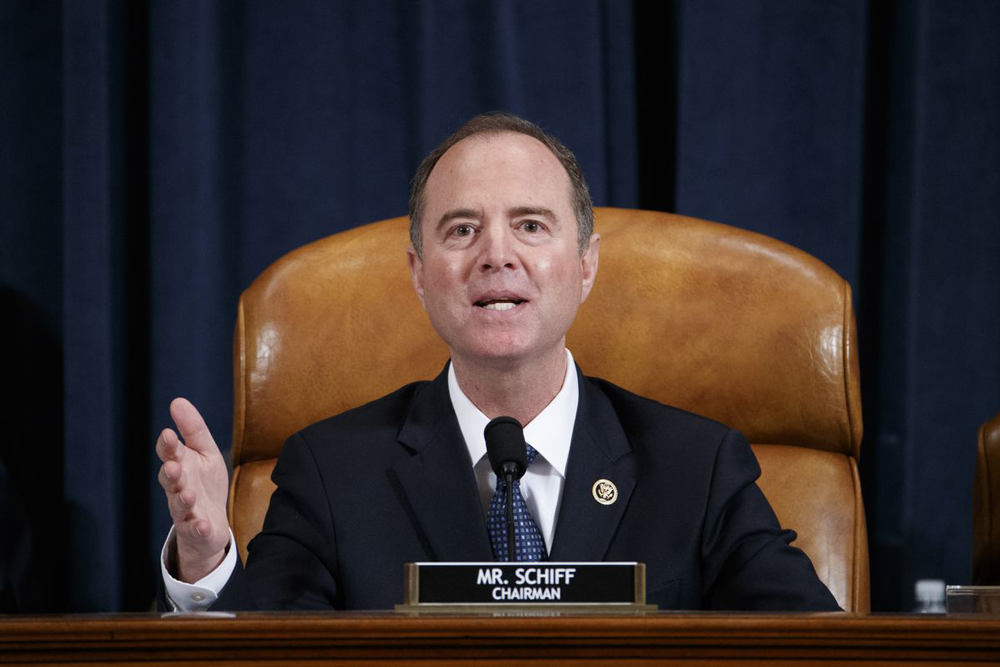Impeachment is a serious action whose sole power lies in Congress. After weeks of impeachment investigations that went on behind closed doors, the House of Representatives moved on to their next phase of impeachment proceedings: public hearings and witness testimonies, which began on Nov. 13. These hearings were conducted by the House Intelligence Committee. The committee is comprised of both Democrats and Republicans, with Democrat Adam Schiff leading the hearings.
The heart of the inquiry is whether Trump used the powers of his office to pressure Ukraine into helping his reelection by announcing investigations into his political rival.
Since Russia is at war with Ukraine (our ally), the question is whether President Trump put his own political agenda ahead of US national security interests. In addition, allegedly Trump withheld congressionally-approved military aid to Ukraine in exchange for these investigations, as well as a meeting between the two presidents. These facts have been confirmed through multiple sources, including the July 25 transcript of the phone call between the two presidents, as well as acting White House Chief of Staff Mick Mulvaney who brazenly admitted a quid pro quo at a live press conference in October.
Congress decided to let the hearings be televised, and allow President Trump to be present and represented by counsel if he wished. This came after weeks of the president complaining that he was denied due process. Nonetheless, he declined to attend. Previously, I stated that Trump’s staff would have to comply with subpoenas issued by Congress and be forced to testify under oath. However, Trump has defied the subpoenas and blocked critical staff members from testifying, including White House Chief of Staff Mick Mulvaney and former White House counsel Don McGhan, although Trump’s attempt to block McGhan from testifying has been thwarted by a recent ruling from a federal judge.
By the time you read this article, the House Intelligence Committee and Chair Adam Schiff (D-CA) will have compiled and submitted a report of its investigation to the House Judiciary Committee. The Judiciary Committee will decide whether or not to draft articles of impeachment — the “charges” against Trump.
If House Democrats move ahead with articles of impeachment, that would trigger a Senate trial in which Republicans can use their majority to protect Trump. It would require a two-thirds majority vote in the Senate to remove Trump from office. That would require 20 Republicans to vote for impeachment, along with all of the Senate Democrats and Independents.
The public hearings took place from Nov. 14 through 21 in front of the House Intelligence Committee. The witnesses who were called to testify are top career diplomats, experts and advisors to the President on national security issues relating to Ukraine and Russia. Here is a list of some of the key witnesses that testified and the highlights of some of their testimonies:
Marie Yovanovitch: former Ambassador to Ukraine who was forced from her post by President Trump in May. Her testimony will be remembered by the president’s live tweet which was critical of Yovanovitch’s tenure. Democrats may use this historic interjection as one of the articles of impeachment: witness intimidation.
Kurt Volker: former special envoy to Ukraine.
Jennifer Williams: Senior Advisor to Vice President Mike Pence.
Lt. Colonel Alexander Vindman: Director for European Affairs for the United States National Security Council (NSC).
Both Jennifer Williams and Lt. Colonel Alexander Vindman debunked the conspiracy theory of illegal activity by the Biden family and Ukraine.
Tim Morrison: an NSC staffer.
Gordon Sondland: United States ambassador to the European Union. He strongly stated that there was a quid pro quo initiated by President Trump and implicated top White House officials in the scandal, including acting Chief of Staff Mick Mulvaney, Energy Secretary Rick Perry, and Secretary of State Mike Pompeo.
Fiona Hill: President Trump’s former top adviser on Russia and Ukraine policy. Fiona Hill, as a bipartisan advisor, put to rest the conspiracy theory that Ukraine was involved in interfering with the 2016 elections and not Russia. She also expressed conflict between implementing official foreign policy and President Trump’s political agenda.
David Holmes: an official from the US Embassy in Ukraine.
Laura Cooper: the Pentagon’s Russia-Ukraine expert.
David Hale: a top State Department official.
These hearings were just fact-finding hearings to gather information and record it under oath. Now we will hear the legal side of the findings and what it means for Trump.
By the time you read this article, the House Intelligence Committee and Chair Adam Schiff (D-CA) will have compiled and submitted a report of its investigation to the House Judiciary Committee. The Judiciary Committee will decide whether or not to draft articles of impeachment — the “charges” against Trump.
If House Democrats move ahead with articles of impeachment, that would trigger a Senate trial in which Republicans can use their majority to protect Trump. It would require a two-thirds majority vote in the Senate to remove Trump from office. That would require 20 Republicans to vote on impeachment, along with all of the Senate Democrats and Independents.
Questions now are raised whether Speaker of the House Nancy Pelosi will continue down the road of impeachment, or stop in view of a dead end in the Senate. Or, perhaps the impeachment train has too much momentum to stop.

